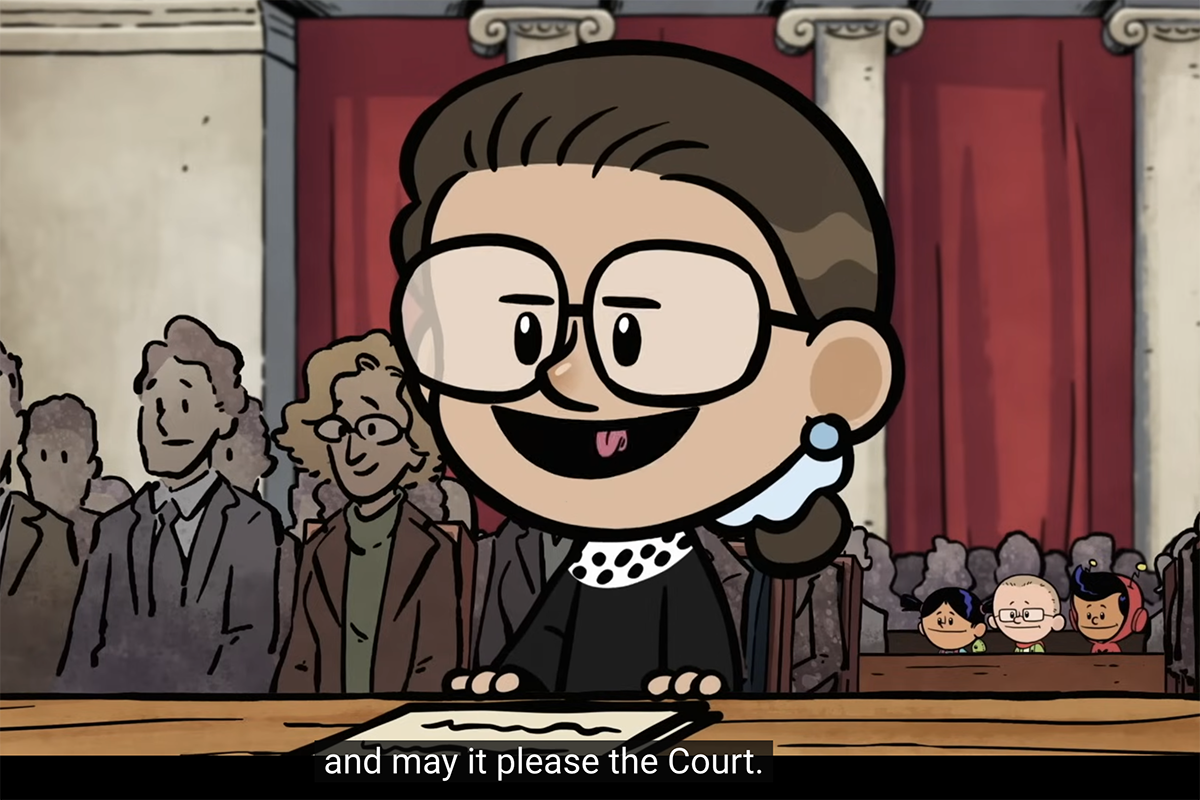“Xavier Riddle and the Secret Museum” just premiered a truly delightful episode about Justice Ruth Bader Ginsburg — and it even features a bissel (that’s “a little bit”) of Yiddish.
The show, which is based on a series of books by author Brad Meltzer called “Ordinary People Change the World,” tells the stories of famous historical figures and how they changed the world — as children, and as grown-ups. It follows the adventures of Xavier Riddler, his little sister Yadina and their friend Brad, who is based on Metlzer himself (and yes, he is Jewish, too) as they travel back through time and meet these iconic figures, from Albert Einstein to Golda Meir.
In a new episode that premiered this week on PBS, Yadina deals with gender-based discrimination when their troupe leader decides that because there’s not enough room in the wood shop, the boys will go in for a building activity, while the girls will have to do arts and crafts. Yadina, who dreams of creating a turtle dream house for her stuffed turtle named Dr. Zoom, is indignant about the situation.
As an iconic fighter for equal rights, Justice Ruth Bader Ginsburg is obviously the perfect person to help Yadina with her problem.
The kids first travel back in time to 1940, where Ruth Bader Ginsburg is celebrating her birthday by giving ice cream out to orphaned Jewish children at the Pride of Judea in her native Brooklyn. Ruth is there with her mother Celia. “Ich vell zayn nach dir” — “I’m next” — a little girl yells in Yiddish during the episode. Yadina recognizes the Jewish tongue immediately. It’s the only moment in the episode that acknowledges Ginsburg’s Jewishness, but it’s still incredibly moving to see Yiddish on a show watched by so many young kids across America.
“I’m very proud of you for sharing your birthday party, Ruth. I think it will mean a lot to these kids,” Celia tells young Ruth. Later in the episode, Ruth, wearing her signature black robe and jabot, shares with Yadina that it was her Jewish mother who taught her that she can change the world.
Yadina and the boys meet RBG again in the 1970s — she’s facing the Supreme Court as a lawyer, trying to defend the rights of women in the Air Force. It’s 1972, and the lawyer is arguing on the case of Struck v. Secretary of Defense (the kids use their handy dandy translator, which they earlier used for Yiddish, to understand Ginsburg’s legalese), which fought against Air Force policy that called for women to either leave the court or abort their babies if they became pregnant.
While the episode doesn’t go into the specificities of the case, Ginsburg explains that “this case is about an idea, an unfair idea” — the idea that women are supposed to be taking care of the home and their children while men are given extra pay when they start a family. She calls out the policy as discriminatory and wrong.
“Ruth was amazing,” Yadina says after her statements. “The justices have to agree with her.” And of course, they do.
Twenty years later, the kids return to the Supreme Court, now seeing Ginsburg at the dais as an actual Justice in the Supreme Court, the second woman in history to do so. The episode praises her fight for Americans with disabilities, LGBTQ rights and equal rights for all.
Seeing Ginsburg go from making small changes in Jewish kids’ lives to changing the country’s history empowers Yadina to fight for a small change in her life, too.
While the episode isn’t particularly Jewish, the book it is based on, “I Am Ruth Bader Ginsburg,” which came out earlier this month, is wonderful and full of Yiddishkeit. Meltzer, who had a personal connection to Justice Ginsburg, believes that there was something inherently Jewish in her world-changing work.
“When you went into her chambers, there was the famous Torah saying, ‘Justice, justice, you shall pursue’ — that was truly one of the few things on her wall,” Meltzer told Kveller last year. “There are people who are Jewish and who are famous, but she’s famous because of the lessons of her Judaism. Those lessons that she brings, those lessons of justice, are taught to her by our religion. They’re why she’s famous.”








